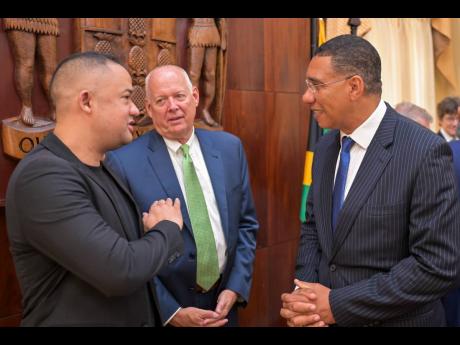Jamaica signs MOU with Canadian firms for nuclear energy
Jamaica has signed a memorandum of understanding (MOU) with Canadian firms Canadian Nuclear Laboratories Ltd and Atomic Energy of Canada Ltd, as the country seeks to diversify its energy sources.
Prime Minister Andrew Holness said that, while Jamaicans won’t see the real benefits for another decade, there would still be an immediate benefit, as the country will be able to have Jamaicans study with the experts in Canada.
“The purpose of this memorandum of understanding is not just to explore possibilities but to bring possibilities to life. This is not a symbolic signing, this is not public relations. This is about Jamaica exploring technology, embracing technology for its economic development,” Holness said.
Although details were not mentioned during the signing on Tuesday, Holness said the MOU would provide knowledge and skills for Jamaicans.
Describing the signing as a pivotal moment in Jamaica’s energy transformation, Holness said, “It’s about putting us in a position to take advantage of the future. The future may not materialise, but you will have skills that you could use for other things.”
Holness pointed out that, with Jamaica depending on fossil fuels to supply 85 per cent of its energy needs, it leaves the country vulnerable to external shocks and global oil and natural gas price fluctuations.
Touted as a source of clean and sustainable energy, Holness said Jamaica’s interest lies in small modular reactors.
Not new to Jamaica
Small modular reactors (SMRs) are said to be advanced nuclear reactors with a power capacity of up to 300 megawatts of electricity per unit, which is about one-third of the generating capacity of traditional nuclear power reactors. The smaller size enables an SMR to be transported more easily to a location for installation.
Nuclear energy is not new to Jamaica. The country’s first nuclear research reactor, SLOWPOKE-2, a pool type reactor designed by Atomic Energy of Canada, was installed at The University of the West Indies (UWI) Mona campus back in 1984 and has been used in research in several areas. It is the Caribbean’s first and only nuclear reactor.
Daryl Vaz, minister of science, energy, telecommunication and transport, who has portfolio responsibility for the project, hailed it as “a significant milestone in Jamaica’s journey towards sustainable energy development”.
“This MOU represents a significant advancement in Jamaica’s pursuit of of innovative and clean sustainable energy solutions focusing on nuclear research and development. This MOU also represents the opening of new doors for collaboration in the field of nuclear research and development, an area that holds great promise for our nation’s energy future through responsible energy management,” Vaz said.
In the meantime, Fred Dermarker, president and CEO of Atomic Energy of Canada Ltd, said Jamaica and Canada are excellent nuclear partners and the MOU will build on the past relationship and advance ongoing discussions on nuclear technology, including the production of nuclear power and other clean energy sources.
“More recently, we have become experts at the management and long-term disposal of nuclear waste. From mining uranium from the ground to the disposal at the very end of the process, Canada has capabilities that it can share with Jamaica. The signing of this MOU brings two excellent partners together. I have no doubt that, together, we can achieve great things,” Dermarker said.
Fifteen per cent of Canada’s energy is generated by nuclear power.
More than half of the country’s electricity (60 per cent) is generated from hydoelectricity, with the remainder produced from sources including nuclear, natural gas, wind, coal, biomass, solar, and petroleum, according to the Canada Energy Regulator website.
Jamaica’s electricity source is mainly from fossil fuels, with a small percentage coming from solar power, wind and natural gas.

